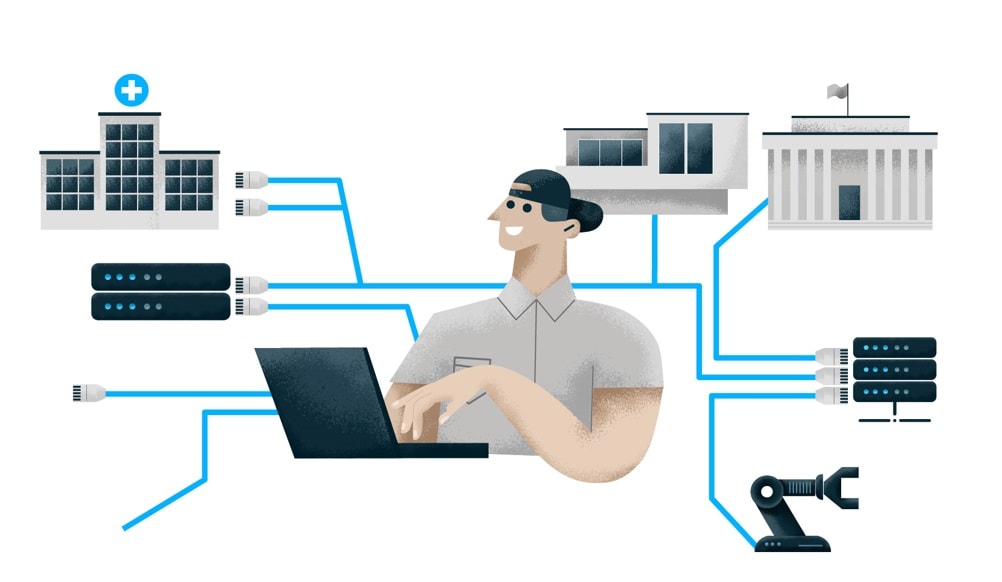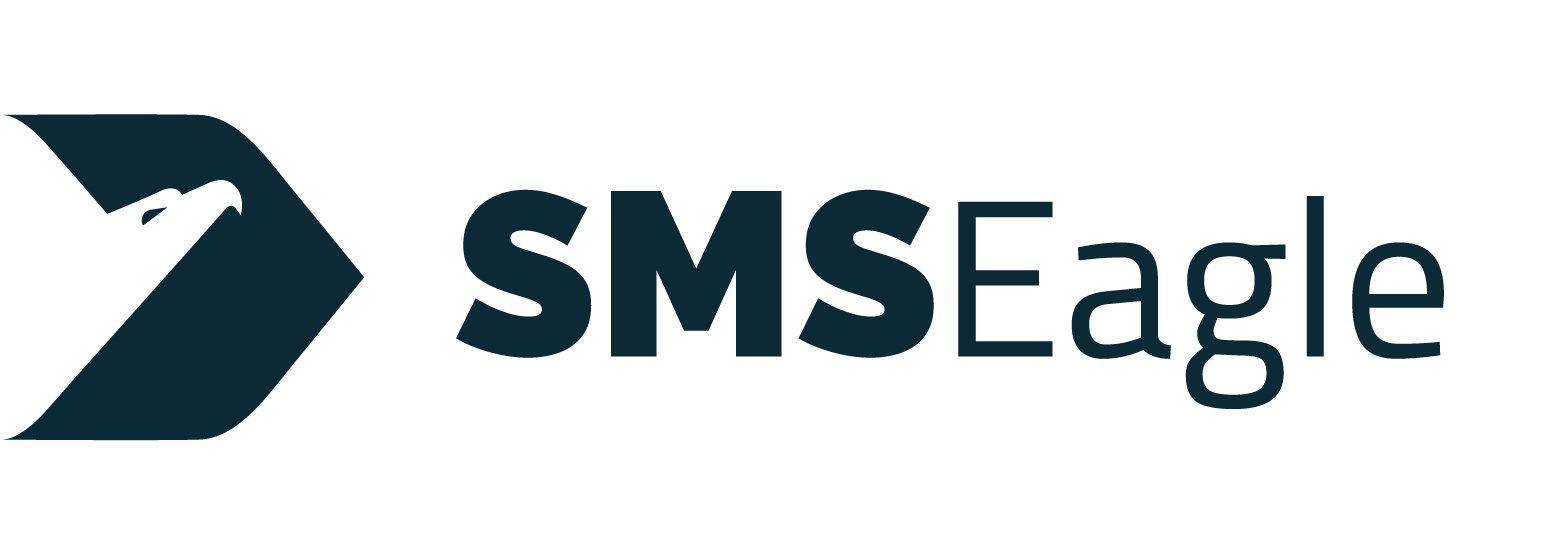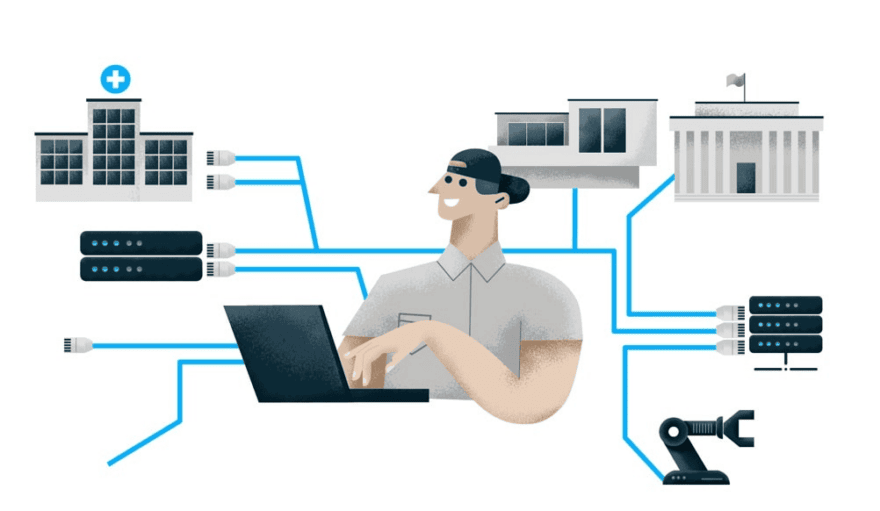How does SMSEagle integration look like?
This guide covers how SMSEagle connects with existing infrastructure, supporting SMS and other channels for messaging across platforms and devices

SMSEagle is recognized as the leading hardware SMS gateway device offering multiple ways to communicate. It allows to send SMS, flash SMS, MMS, voice-calls, wake-up calls, text-to-speech calls, and Signal messaging. SMSEagle enables offline communication and allows organizations to fully control their data confidentiality.
Table of Contents
Ways of how can SMSEagle be Integrated?
SMSEagle offers several methods to integrate with existing systems.
Integration Descriptions for 60+ Systems
First of all you can use ready-to-use plugins/descriptions for systems, such as Nagios, Zabbix, PRTG, Microsoft Teams, Slack, and Jira and many more (you’ll find all SMSEagle Integration Plugins here) These plugins allow to connect SMSEagle with monitoring, collaboration, and ticketing systems, adding messaging functions to their workflows, enhancing SMS messaging capabilities.
REST API for Custom Integrations
SMSEagle’s REST API allows for user-defined integrations. The API supports HTTP GET/POST methods, enabling developers to link SMSEagle with custom applications for SMS messaging. Businesses can use the API to automate messaging as required, integrating it with software that matches organizational needs.
Email to SMS and SMS to Email
Sometimes integration with API is not possible. This is where Email to SMS comes into play. You may easily convert emails generated in your system into SMS. With this built-in feature SMSEagle will easily convert emails and send them as SMS to single or multiple recipients. This is a popular integration scenario for closed systems. On the other hand, with SMS to Email, incoming SMS messages are automatically forwarded to designated email addresses, enabling easy logging and tracking of messages within email systems. For more information on how the integration looks like please check this link.

How to Integrate SMSEagle?
Integrating SMSEagle with business systems for messaging requires selecting the best SMS gateway hardware to ensure optimal performance and reliability. Here’s how to approach this process:
Step 1: Select SMSEagle Device Model
Decide on the SMSEagle model or hardware SMS gateways that suit the size and needs of the organization. Each model has a set of features designed for messaging needs, ensuring organizations can match a device to their expected usage and message volume. The main difference between them can be found here.
Step 2: Plan the Integration
Determine which systems and applications SMSEagle will connect to, whether CRM, email, or network monitoring tools. Organizations can choose from available plugins or set up connections through the REST API for integration with applications that may not have plugins. Additionally, researching local mobile operators and comparing their plan options, especially those offering unlimited SMS services, can help in selecting the best deals tailored to user needs.
Step 3: Install and Configure
Set up SMSEagle in a location with power and cellular connectivity. Insert SIM into SMSEagle device, and configure IP settings. Configure features you will use on your SMSEagle, messaging rules, templates, etc. according to organizational communication needs.
Step 4: Test Messaging
Begin testing the system to confirm all messaging workflows operate correctly. Test message flows for all relevant channels. Ensure the configuration meets your expectations.
Step 5: Ongoing Maintenance
Perform software updates, ensuring the hardware and software remain operational. Ongoing maintenance keeps SMSEagle running and ensures that messages are delivered as planned.
SMSEagle Technical Support
SMSEagle provides support for clients during integration, whether they use standard plugins or create custom workflows.
The support team assists with setup, configuration, and API connections, ensuring SMSEagle fits the organization’s requirements. For integrations involving complex software, SMSEagle’s team offers guidance to configure these systems and optimize message flows.
SMSEagle’s support will help with installation, integration, and troubleshooting. Additionally SMSEagle knowledge base offers manuals, guides, and resources, providing users with materials for integration. For additional support, SMSEagle’s team is available through email, phone, and remote access, providing help when needed.

Explore SMSEagle demo device
SMSEagle is a hardware & software solution that guarantees a swift delivery of your messages to designated recipients, whether it’s for notifications, alerts, or important updates.
- 14-days free trial
- Access to physical device
- No credit card required
- Access to over 20 functionalities
SMSEagle Benefits
The benefits of SMSEagle lie in its ability to provide robust, internet-independent communication, essential for businesses requiring reliable, real-time SMS message delivery.
The multi-channel capabilities of SMSEagle—supporting SMS, MMS, and voice calls—allow organizations to communicate flexibly, ensuring that messages are received by the right people at the right time.
The device’s offline operation ensures message delivery even when internet access is unavailable, ideal for critical industries like healthcare and manufacturing where continuous communication is necessary.
SMSEagle’s integration capabilities with popular platforms and custom APIs make it adaptable to a variety of organizational needs, reducing the complexity and time needed for setup.
For businesses concerned with data privacy, on-premise data storage ensures sensitive information stays within the organization’s infrastructure, enhancing security & confidentiality.
Cost efficiency is also a major benefit, as SMSEagle’s one-time hardware cost eliminates recurring fees typically associated with online gateways.
Lastly, scalability and dedicated support enable SMSEagle to grow with the organization, with assistance available for setup, troubleshooting, and advanced configurations. These features collectively position SMSEagle as a cost-effective, adaptable, and secure communication tool for organizations
SMSEagle features
With extensive feature set, SMSEagle is equipped to handle a wide range of communication needs, providing businesses with reliable, secure, and adaptable messaging tools across industries.
With extensive feature set, SMSEagle is equipped to handle a wide range of communication needs, providing businesses with reliable, secure, and adaptable messaging tools across industries.
SMSEagle offers a range of messaging capabilities, including standard SMS for alerts and updates, MMS for media-rich content, and Signal messaging for secure, encrypted communication. Additionally, the device supports wake-up calls (ring-only) for attention-grabbing alerts and text-to-speech calls, converting text into automated voice messages for delivery. With features like conversation mode, which organizes messages like a smartphone for easier tracking, SMSEagle provides flexibility across communication methods, ensuring messages reach recipients in the most suitable format.
Reliability is key for SMSEagle, featuring High Availability (HA) clustering to maintain function during hardware issues and modem failover to keep messaging operational when the primary connection is interrupted. Power options include Power over Ethernet (PoE) and AC/DC, ensuring operational flexibility across environments.
Security and data control are bolstered through on-premises data storage, keeping messages local and compliant with privacy regulations. SMSEagle supports HTTPS and MFA with OTP, which provide extra layers of security. The device includes blacklist filtering to prevent unwanted numbers from sending or receiving messages, and callback URL functionality allows for real-time alerts based on message status.
For monitoring and system management, SMSEagle includes autoreplies for automated responses, escalation rules to reroute messages if primary recipients are unavailable, and periodic SMS scheduling, which is useful for shift-based notifications. Temperature and humidity alerts offer additional environmental monitoring, ideal for facilities where these factors impact operations.
User management and customization options support LDAP integration for centralized control, multi-user access for team collaboration, and message templates for quick, standardized communication. A phonebook allows for contact organization, making communication more streamlined.
Network monitoring compatibility is enhanced with support for SMTP, SNMP, and HTTP/HTTPS protocols, allowing for system health tracking and notifications if issues arise. For integration with IoT and networked systems, the Callback URL and MQTT protocols expand SMSEagle’s adaptability within different network configuration
Communication systems help organizations manage tasks, automate alerts, and ensure that messages reach intended recipients at the right time. Choosing the best hardware SMS gateway is crucial for optimizing business communication. SMSEagle’s hardware SMS gateway connects with a variety of tools, allowing messaging without dependence on internet connectivity. This guide covers how SMSEagle connects with existing infrastructure, supporting SMS and other channels for messaging across platforms and devices.

RCS Messaging: everything you need to know about them
This article explores how RCS (Rich Communication Services) improves traditional SMS by enabling features like high-resolution media sharing, real-time typing indicators, and interactive messaging. We’ll break down how RCS works, how it transmits messages over mobile data or Wi-Fi, and

SMSEagle v6.11 – New Software Version Now Available!
We’re excited to announce the release of SMSEagle software version 6.11! This latest update brings several improvements and fixes, with the biggest changes focused on users of the VOICE add-on.

SMSEagle at Axle IT Event 2025
What if a single missed alert caused hours of downtime or a security breach? At the Axle IT Event 2025, experts shared how to avoid these risks with smarter solutions. One highlight was Radoslaw Janowski’s session on ensuring critical alerts


